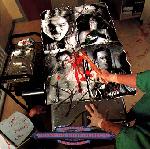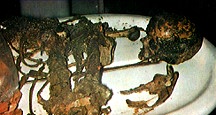
Necroticism - Descanting the Insalubrious
Earache, 1991 - Mosh 42

Necroticism - Descanting the Insalubrious
Earache, 1991 - Mosh 42
"SECOND LAYER.
I have the feeling many times that I could bite my child. I often bit when I
was a child, if I was naughty.
I often think of the graveyards and how the dead bodies are rotting in the
ground. I should much rather be cremated.
I should like to cut off a dead man's member and have it sewed fast to me. I
should like to be a man. I should like to rob a dead man's soul before it went
to heaven and turn myself into a man. I would then seduce all women.
I want to taste every man and every girl, what their flavor is.
--Dr. Wilhelm Stekel, "Cannibalism and Necrophilism," Sadism and Masochism
 Carcass's beautifully titled Necroticism - Descanting the Insalubrious is
a masterpiece of technical death/grind, a genre which Carcass basically
originated with earlier, more primitive works such as 1988's Reek of
Putrefaction and their followup opus, Symphonies of Sickness.
Carcass's beautifully titled Necroticism - Descanting the Insalubrious is
a masterpiece of technical death/grind, a genre which Carcass basically
originated with earlier, more primitive works such as 1988's Reek of
Putrefaction and their followup opus, Symphonies of Sickness.
Necroticism takes some of the elements to be found on Symphonies and extends the ideas further to create a uniquely disturbing reflection of reality, deftly painted by the fluid guitarwork of Bill Steer and Mike Amott, and the twisted wordplay of bassist/lyricist/principal vocalist, Jeff Walker. A morbid fascination with human mortality pervades Walker's lyrics; equally obvious is his dedication to the craft, with numerous complexities and intricacies woven together in his graphic descriptions of the bleakness of the human condition. Inpropagation, for example, issues forth a detailed examination of the ultimate meaninglessness of human life, as the song presents a tale describing the use of human corpses as plant food (or, as one of the solos is named, "Humanure"). In a similar vein, Pedigree Butchery expresses Walker's views on existence as it details the use of infants as dog food, while Carneous Cacoffiny is a brilliantly conceived description of the use of human flesh as guitar strings, written with the acerbic wit common to all of Walker's work.


Incarnate Solvent Abuse provides a further example of Walker's nihilism. It chronicles the use of human remains as an adhesive to be used as an intoxicant ("Glue stiffing", as one of the leads is named). Such a lyrical focus can be better understood within the context of Carcass's socio-economic background; glue sniffing is a problem of epidemic proportions in England, particularly among children lacking the resources for other drug experimentation. The lyrics provide some excellent examples of the layers of complexity to be found in Walker's lyrics; there are obvious double-entendres in both his use of the word quietus (meaning either release or death), and in the use of shambles (meaning either disaster or slaughterhouse):
The rhythm and lead work of guitarists Bill Steer and Mike Amott provides for an appropriate soundscape for these atrabilious narratives. The rhythm work alternates between intricate, melodic moments, and bludgeoning power chords played with clinical precision. The solos are best described as sublime; delicate moments, stunning in their pulchritude, which provide a sharp contrast to the harsh rhythm work. To use a cliche, each lead is a piece in and of itself. But whereas this is a blatant exaggeration in most cases, it's justified in the case of Carcass. One can close one's eyes during Steer's aptly named "Gross disorientation" lead, found in Lavaging Expectorate of Lysergide Composition, and imagine the victim stumbling around in a drug-induced haze, while Amott's "Compost humous horticulture" (Inpropagation) conjures up images of mourners weeping over the death of a loved one.
As is usual with a Carcass release, the drumming is a fluid mixture of blast beats, a tasteful use of double-bass, and Ken Owen's typically relaxed style. Unlike many drummers, Owen can never be accused of overplaying; one of Carcass's defining characteristics is that each member knows exactly what not to play in order to make a piece of music work.
From the opening description of the role of the pathologist, to the crushing finale of Forensic Clinicism/The Sanguine Article, this album never ceases to amaze, and is one of the few I could ever feel comfortable guaranteeing anyone should appreciate.
